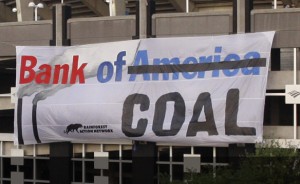 Bank of America released its new environmental initiative this morning, grandly declaring that “Today’s announcement builds on Bank of America’s legacy of leadership in the environmental arena.”
Bank of America released its new environmental initiative this morning, grandly declaring that “Today’s announcement builds on Bank of America’s legacy of leadership in the environmental arena.”
While the bank’s initiative focuses on its financing of renewable energy, key construction projects and reduction of its own operational emissions (emissions from its buildings and facilities), the bank makes no mention of its role in financing fossil fuels, like coal, which are the leading cause of climate emissions in the United States.
Plain and simple, increasing support for renewable energy and not decreasing funding for coal will not do what’s needed to reduce emissions or protect the climate.
Bank of America’s commitment to renewable energy is a step in the right direction for our climate, however, the bank is simultaneously taking two steps back by continuing to underwrite the coal industry. The bottom line is we cannot reduce the emissions necessary to stem climate change with renewable energy funding alone, we must also curb our use of coal and Bank of America’s new environmental commitment makes no move to do that.
Coal is the elephant in Bank of America’s record. Bank of America boasts about increasing its commitments to renewable energy, but omits reporting its steadily increasing financing for coal—the number one source of U.S. climate pollution. Between 2010 and 2011, Bank of America provided more than $6.4 billion in underwriting for U.S. coal.
Bank of America finances climate and community pollution at every stage in the coal industry. It spends billions each year underwriting mountaintop removal coal mining companies and utilities that operate the dirtiest coal-burning power plants in the country.
Check out our video of people who traveled to Bank of America’s 2012 shareholder meeting to explain to the bank what impact their underwriting is having on local communities across the U.S.
[youtube TsMB2CuP3zM 550]
If Bank of America wishes for a true legacy of environmental leadership, then it is clearly time to update its position on coal. Coal’s devastating impact on both climate and public health comes at a time when the profitability of both coal mining and coal-fired power generation is way down and presenting a clear financial risk for the bank.